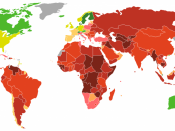The Role of Perception in the Decision-Making ProcessWhat is perception? How can a person's perception of others impact an organization's behavior? What are the positive and negative effects of using perceptive shortcuts when judging others? How are decisions in real world organizations actually made? How can our perceptions shape ethical or moral decisions? These are the questions that will be attempted to be answered in this essay.
According to Robbins, S. (2005) "Perception is a process by which individuals organize and interpret their sensory impressions in order to give meaning to their environment". The role of perception in the decision-making process goes beyond the five senses (1) sight, (2) hearing, (3) smell, (4) taste, and (5) touch. The representation of perception in decision-making is based on a person's internal understanding and personal analysis of environmental observations combined with past experiences. Consequently, perception varies from one individual to the next.
There are many factors that can influence or shape a person's perception during the decision-making process.
Robbins, S. (2005) identifies three types of factors that influence perception:1. Factors in the Perceiver: Personal Characteristicsâ¢Attitudes: feelings, beliefs or behavioral tendencies towards specific people, ideas, objects etc.
â¢Personality: individual behaviors, temperament, emotions or state of mind.
â¢Motives: reasoning toward problem-solving or achieving a goalâ¢Interests: selective concentration on personal likes or dislikesâ¢Experience: knowledge gained from past involvements or exposure.
â¢Expectations: what is hoped to be achieved.
2.Factors in the Target: Observed Characteristicsâ¢Novelty: uniqueness.
â¢Motionâ¢Soundsâ¢Sizeâ¢Backgroundâ¢Proximityâ¢Similarity3.Factors in the Situation:â¢Timeâ¢Work settingâ¢Social settingHow can a person's perception of others impact an organization's behavior? To find the answer to such a question one must first understand organizational behavior. According to Robbins, S. (2005) organizational behavior (OB) is defined as "a field of study that investigates the impact that individuals, groups, and structure have on behavior within...


